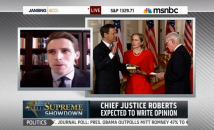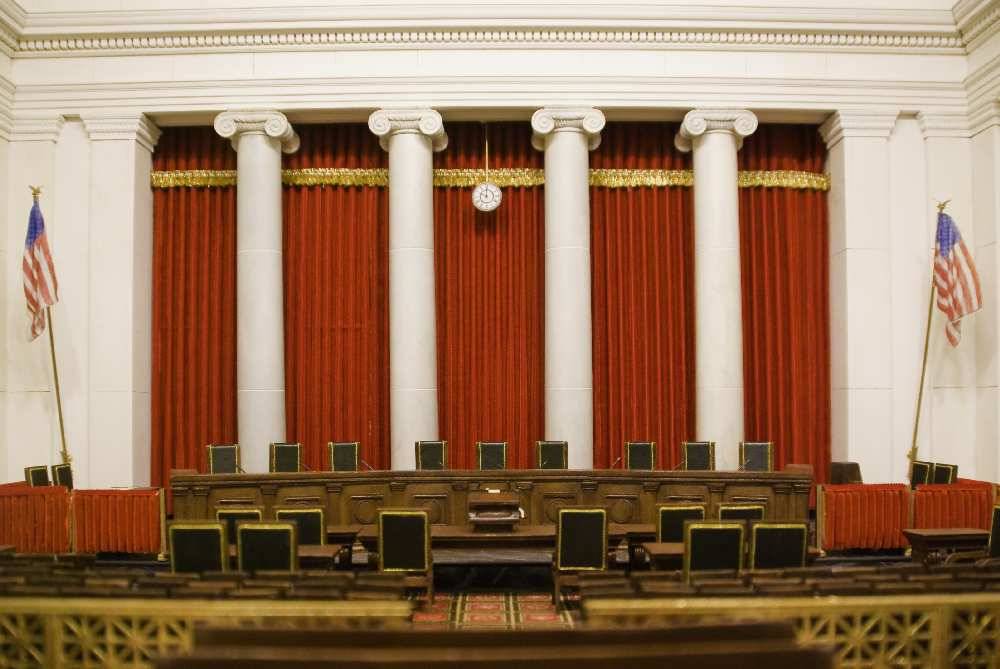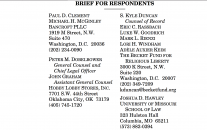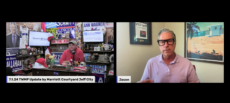JEFFERSON CITY, Mo. – Josh Hawley, college professor and Republican candidate for attorney general, has been touring the state for well over a year speaking at Republican events and touting his accomplishments arguing last year’s Burwell v. Hobby Lobby ruling, but what he actually did in that case seems to be unclear to many Missourians.
Due in part to Hawley’s liberal description of his efforts, some Missouri Republicans are surprised that when they hear Hawley say that he argued the case, as he didn’t actually do any speaking in the case at all. In fact, he wasn’t admitted to the bar to argue at all before the Supreme Court in March 2014.
“My wife and I have heard Josh Hawley speak multiple times and is my recollection and hers that he argued the Hobby Lobby case before the U.S. Supreme Court,” Rep. Rocky Miller, R-Miller County, said. “When we both found out he was not admitted to the U.S. Supreme Court bar until after the case and, therefore could not argue before them, we were shocked.”
In one of the biggest rulings of 2014, the Supreme Court ruled that closely held corporations could be exempt from laws to which owners “religiously object.” Hawley is listed as one of the lawyers on a brief in the case.
The brief was prepared for and submitted in conjunction with the Becket Fund in support of Hobby Lobby. Court records show that the only litigator who did any actual arguing before the court was Paul D. Clement, who is a partner at Bancroft PLLC and formerly served as the 43rd Solicitor General of the United States from June 2005 until June 2008.
Clement is listed alongside Michael McGinley as attorneys with Bancroft PLLC in Washington, D.C. Peter Dobelbower and John Graham are listed General Counsel and Assistant Counsel for Hobby Lobby.
Kyle Duncan, a former Louisiana Solicitor General, is listed as the counsel of record and Eric Rassbach, Luke Goodrich, Mark Rienzi, Lori Windham, and Adele Keim are listed with The Becket Fund in Washington D.C.
Joshua Hawley is listed last with the University of Missouri School of Law with his taxpayer-funded office address and phone line listed as his contact information.
In February 2014, Hawley was marketed to Newton and Jasper County Republicans as the “Hobby Lobby Lawyer” and made the featured speaker of the Republican dinner.
A June 2014 press release from Hawley’s group – the Missouri Liberty Project – called Hawley “Hobby Lobby Litigator Josh Hawley.” The release lead with “Missouri Liberty Project founder Josh Hawley, an attorney who helped Hobby Lobby and its owners in their landmark victory for religious liberty at the U.S. Supreme Court…”
Today, his campaign website says, “Josh Hawley is a conservative constitutional attorney who has been to the Supreme Court and won.”
His campaign biography echoes Hawley’s involvement with the Supreme Court.

“In the last five years, Josh has been active in some of the country’s most important court cases. As Senior Counsel for The Becket Fund for Religious Liberty, he has won twice at the United States Supreme Court.”
Again, some would argue that these statements may have overstated his experience. The respondent briefs he participated in writing appears to be the extent of his on-the-record involvement in the Hobby Lobby case. The Missouri Times reached out to the Supreme Court, who said Hawley was admitted to the Bar of the Supreme Court of the United States on May 26, 2015, just weeks before Hawley’s attorney general campaign was launched.
The Hobby Lobby case was argued in March 2014 and the decision was announced on June 30, 2014 – over a year before Hawley’s bar admittance. A representative from court admissions shared that those not admitted to the bar can file briefs as long as paperwork submitted to the office is pending. However, without bar admission, no one could argue a case before the Supreme Court or even be allowed to sit at the counsel table while a case was being argued.
Rule 13 of the U.S. Supreme Court’s Guide for Counsels specifically defines “arguing counsel” and specifies they are the attorney who will be arguing before the court. It also outlines details of courtroom decorum as well as how they are to enter the building and take their seat at either the respondent or petitioner table.
It also specifically lists those who are able to sit inside the court’s brass railing as only members of the Bar of the Supreme Court of the United States, meaning Hawley would not have been able to enter in without bar admittance.
However, Rule 13 does state that, “If arguing counsel desires to reserve space in the public section, counsel must contact the Marshal’s Office,” which means that the arguing counsel, Paul Clement, could have reserved Hawley a seat and he would have been permitted to witness Clement’s arguing of the case – alongside other members of the general public in the gallery.
The fact that he observed the proceedings from the gallery and not as an arguing counsel came as a surprise to one Republican activist who heard Hawley speak last Monday night in Camden County, where she remembered Hawley say he “looked across at the opposing counsel table where the Solicitor General was making arguments he could not believe.”
Hawley has stated he argued the Hobby Lobby case before the Supreme Court to numerous media outlets including The Missouri Times, and many Missouri media outlets have differing ways of describing his involvement before the Supreme Court.
The Columbia Daily Tribune listed him as a counsel for The Becket Fund for Religious Liberty. It described his accomplishments as, “participated in writing briefs in the Hobby Lobby case, a U.S. Supreme Court ruling that allows closely held companies to cite religious objections to refuse to pay for contraceptive coverage. Executive Director Kristina Arriaga said Hawley has resigned from his position with the Becket Fund to run for office.”
The University of Missouri School of Law’s website marketed his efforts as an attorney for Hobby Lobby.
“On Tuesday, March 25, the Supreme Court of the United States heard oral arguments on Sebelius v. Hobby Lobby Stores, Inc., the case involving the Affordable Care Act’s contraceptive mandate. Prof. Joshua Hawley is one of the attorneys for Hobby Lobby.”
His University biography page also touts his appearances on MSNBC, PBS, and National Public Radio.

His campaign website says he was co-counsel on the case where he describes himself as, “A leading national expert on the issue of religious freedom, Josh was co-counsel on the landmark Supreme Court case Burwell v. Hobby Lobby Stores, the most important decision on our First Amendment liberties in decades.”
In an interview with the Associated Press, Hawley painted himself as someone who had expertise practicing before the Supreme Court. “If you want someone who has the expertise to stand up in the Supreme Court of the United States and defend our liberties and defend our values, then elect a constitutional lawyer.”
KMOX referred to Hawley as a constitutional scholar who “helped argue an earlier ObamaCare case before the Court.”
Barb Shelly, liberal columnist and editorial writer for the Kansas City Star, used Hawley’s efforts on the case to promote the Yale educated professor as an attractive alternative for conservatives to his primary opponent, Sen. Kurt Schaefer, R-Columbia.
“[Schaefer] has a GOP primary opponent, Josh Hawley, whose impeccable conservative credentials include arguing before the U.S. Supreme Court on behalf of ‘religious freedom’ in the contraceptives case involving the Hobby Lobby stores,” she wrote.

Shelly’s praise of Hawley was included in an editorial where she referred to Schaefer’s work on the Sanctity of Life Committee that would ultimately result in the University of Missouri ending their agreement with the doctor of Planned Parenthood’s Columbia affiliate to facilitate providing abortions worthy of naming him “the scariest person in Missouri government.” Schaefer did not return calls for comment.
The race for attorney general has already been an exciting one, with Schaefer announcing very early, followed by St. Louis County Assessor Jake Zimmerman and former Cass County Prosecutor Teresa Hensley.
Hawley’s campaign has largely avoided controversy out of the gate.
He announced his campaign the day before a decision by University of Missouri Board of Curators adjusted the public university’s policy on professors taking leave to run for state office. Hawley also argued that the Sunshine Law does not apply to certain communications of taxpayer funded academics.
Outside of his work on the Hobby Lobby case, he has worked with a large law firm and was a clerk for Chief Justice John Roberts. Hawley did not work for Roberts during the time when the latter cast the deciding vote in support of President Barack Obama’s Affordable Care Act.
The Hawley campaign has proven its legitimacy through a very successful fundraising effort putting over $650,000 in the bank in contributions over $5,000 since the account opened in July.
Hawley received $500,000 of that from the Humphreys family just days after the failure to override right-to-work legislation in the veto session. The Humphreys have previously been outspoken in support of a right-to-work law.
The contribution raised eyebrows amongst right-to-work supporters, as well as many who had advocated supporting legislators who voted for the bill. Schaefer voted not only for the bill, but for the previous question to force a vote on the bill, a procedural motion typically reserved for House floor debate. Until May, the PQ was derided by many senators, which made Humphreys’ very large contribution to Hawley was concerning to some, such as House members who switched their votes to support the bill.
Schaefer reported having $1.3 million on hand in July with that number topping $1.4 million with recent $5,000+ contributions. His campaign is ran by Barklage & Knodell, while the Columbia Tribune reported last week that that noted Republican campaign operative James Harris was no longer with the Hawley campaign.
Neither Hawley nor his campaign returned calls for comment.
Updated Sept. 29, 3:22 p.m.: The Becket Fund, which led the charge in the Hobby Lobby case, sent this statement after this article was posted.
“The Becket Fund has had incredible success at the Supreme Court, and Josh Hawley has been an integral part of it,” it reads. “Josh served as co-counsel both in Hosanna-Tabor v. EEOC (2012) and Burwell v. Hobby Lobby (2014). In both cases, his work and Supreme Court expertise were critical to our success at every stage of the litigation.”
Updated Sept. 30, 8:37 a.m.: A gentleman named Brad Todd from OnMessage, Inc. emailed a statement on behalf of the Hawley campaign explaining how Hawley was involved in the Supreme Court cases and providing a statement from Duncan PLLC. Todd was quick to call out primary opponent Sen. Kurt Schaefer.
“Josh Hawley was proud to serve as co-counsel at the Supreme Court for both the Hobby Lobby case and the Hosanna-Tabor case,” emailed Todd. “Both were landmark victories. Winning victories at the Supreme Court is something that happens over months and sometimes years of litigation. Josh was proud to be an integral part of that litigation in both cases. Josh is one of the nation’s leading experts in defending religious liberty — and that is a key point of differentiation in this race for Attorney General against Senator Schaefer, who has been an opponent of religious liberty as a state politician.”
Todd calls himself a consultant with Josh Hawley’s campaign and is a founder of OnMessage Inc., a consulting firm out of Alexandria, Va.
You can view the PDF of Duncan PLLC’s statement here.
Hawley still has not returned requests for comment.
Rachael Herndon was editor of The Missouri Times until 2019. She also produced This Week in Missouri Politics, published Missouri Times Magazine, and co-hosted the #MoLeg podcast. Herndon joined The Missouri Times in 2014, returning to political reporting after working as a campaign and legislative staffer. In 2019, she entered Missouri’s cannabis industry, co-founding Greenway Magazine.










